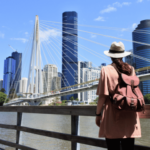The Iglu Guide | Blog
The cost of living in Brisbane for international students

Brisbane is an incredibly diverse city, with one third of the residents born outside Australia and one in five speaking a language other than English at home. A cultural hotspot that’s flanked by both the Gold Coast and the Sunshine Coast, it’s no surprise that thousands of international students are keen to make this riverside city their new student home. But with the rising cost of living impacting every student budget around the world, it’s important to understand what this means in real terms for all international students planning to live and study in Brisbane
Why set up your student home in Brisbane?
With some 280 days of sunshine on tap every year, it’s not too hard to figure out why over 78,000 international students flock to sun-soaked Brisbane as their student destination of choice. Famous for big-city attractions, laid-back attitudes and some of the finest education institutions available for students, Brisbane combines all the benefits of lifestyle and liveability with a safe and welcoming environment. As one of the more affordable Australian cities to live in, every student’s money will stretch that bit further. And when the budgets are under pressure as the cost-of-living bites, the sunshine capital looks even more attractive as a student destination. Here’s what every international student needs to know about living and studying in Brisbane.
Brisbane cost of living – the breakdown
Tuition fees
When it comes to evaluating the cost of living for international students, tuition fees are an important consideration and will be your biggest outlay outside of student accommodation. Brisbane universities are known for their high-quality education, and the city has become a leading destination for international education. If students are after a top-notch education experience at an affordable cost, Brisbane has you covered. All universities are in charge of setting their own fees, and these will be determined by several factors such as the type of course undertaken and level of study. Higher ranking institutions tend to charge higher fees, but many universities also offer scholarship opportunities to high achieving international students, such as The University of Queensland International scholarship. As well as tuition fees, international students should factor in additional budget for textbooks and stationary costs.
What can I expect to pay a year?
Course fees range between $20,000 and $45,000 for a bachelor’s degree, and between $22,000 and $50,000 for a Master’s.
These do not include medical or veterinary degrees which can be significantly more expensive.
Student accommodation costs
Affordable student accommodation is certainly easier to find in Brisbane than other Australian cities, but it’s still important to make sure you have budgeted a sufficient amount for your needs. The options range widely from shared student housing, through to on-campus student accommodation or purpose-built student accommodation (PBSA). The cheaper housing options tend to be located further away from the city centre and will involve more travel expense, so it’s important to work out from the beginning what your needs will be to make the most effective financial choice. Consider the impact of each scenario to see where you could make savings. For example, if a gym is important to your wellbeing, this may already be included in your student accommodation – immediately saving you extra money. If you enjoy an active social life – a student community on tap will be much cheaper than going out and overspending the budget. If you’re concerned about rising utility costs, choose an inclusive student accommodation option where your budget is well protected with just one weekly bill. And if you are concerned about travelling alone at night, it could be worth investing in more central student housing and saving on transport costs.
What can I expect to pay?
On-campus accommodation costs: $300-550 per week
Iglu Student Accommodation in Brisbane: From $349 per week (including bills)
Shared rental: $160-$250 per week
Food and entertainment
Brisbane’s diverse cultural scene means that there is plenty on offer in the form of entertainment, with a packed cultural calendar in action across the year. The city’s also home to multiple sporting venues and tourist destinations which means there are a great deal of distractions and ways to spend your money. But with the rising cost of living hitting students pretty hard, there’s also plenty of ways to get smart with your money, and make savings along the way. Keep your weekly food bill in check by combining forces with your fellow students, taking advantage of bulk-buy offers and investing in high-energy foods that will keep you full until the next mealtime. Stay ahead of Brisbane’s cost crunch by cooking healthy meals that won’t break the bank, and be sure to take advantage of all those student deals out there. Stock up the pantry and freezer with canned and frozen veggies, check out the local food markets for bargains and save on going out by making your own fun at home. Friends come for free, and good company doesn’t cost a cent.
What can I expect to pay?
Griffith College recommends that students should budget between $140-280 per week for groceries and eating out.
Many restaurants and bars have weekly student deals on offer, and students can also save money at the cinema by heading out to the cheap student nights that usually run early in the week.
Student travel costs
Brisbane has an extensive public transport system that makes getting around the city an absolute breeze. And best of all, you can do much of it for free. Check out the complimentary inner city bus loops that circle around the city every ten minutes, or jump on the free CityHopper river service that will take you all along the river from North Quay Terminal right up to New Farm. Students will want to get hold of a Translink go card, as this is the best way to save money on transport costs. Using your go card is a whopping 30% cheaper than buying a paper ticket, and travelling in off peak times can save you up to 20% off the usual price. Valid on all Translink buses, trains, ferries and trams in the area and beyond, simply touch on and touch off and the correct fare will automatically be deducted. Although international students are not currently eligible for concession prices, the competitive transport prices make it a budget-friendly option for all students.
What can I expect to pay?
Go card adult fares are calculated on the zones you travel across. Subtract the lowest zone from the highest zone and add 1. This will determine the number of zones you will be charged for.
Zone 1: $3.55 ($2.84 off peak)
Zone 2: $4.34 ($3.47 off peak)
Up to Zone 8: $21.48 ($17.18 off peak)
The 8th journey onwards in a 7-day period is charged at half price.
Selected events include free travel.
Health and wellbeing
When the cost-of-living pressures start to bite, it’s even more important for international students to focus on personal health and wellbeing – and it doesn’t have to eat into the budget. Exercise is a great way to clear the mind and refresh your thoughts, and if your student accommodation doesn’t have access to a gym, pull on your runners and hit the streets or go for a refreshing walk. Jump on a bike and take advantage of the extensive Brisbane cycleways, or grab some friends and hike out into the spectacular nature that surrounds the city. Alternatively, check out some bedroom-based meditation and wellbeing apps, or take over the communal living area with friends and try out some work-out videos. Be sure to check in regularly with friends for emotional support, because good company is always the best medicine and doesn’t cost a thing.
What can I expect to pay?
Brisbane CBD gyms can cost between $16-$38 per week.
Choose student accommodation that includes access to a gym to save money.
*All costs approximate as at June 2023


